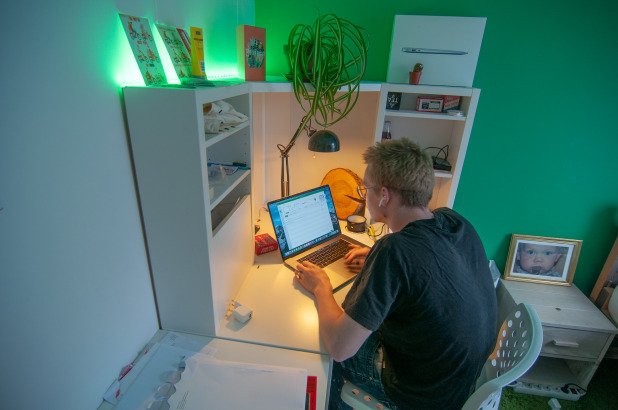Paragraph 2: Earthquakes
What Causes Earthquakes?
Many people live in areas where earthquakes occur occasionally.
Why is it that earthquakes occur in those particular areas and not everywhere?
When a ocean floor is slowly slipping under a continental floor, nothing is happening.
But when it's stuck, and it suddenly moves under, there is a huge shock! An earthquake is born.
The shock is normally the highest at the points were the ocean floor was stuck. This is called the epicentre.
The effects of earthquakes
Earthquakes are measured everyday.
The most of them, you aren't feeling.
Earthquakes are measured in the scale of Richter.
1 till 12, above 10 is never measured.
Sometimes earthquakes occur on the ocean floor, those sometimes give tidal waves.
Tidal waves which reach land, are called tsunamis and can be tens of metres high.
The earth's crust moves.
The earth's crust consist s of pieces of ocean floor and pieces of continent. The pieces of earh crust are also called plates.
The movement of the earth crust plates, is called plate tectonics.
Plates move very slow.
Unfortunately, you can't predict the exact locations of an earthquake.
All you know is if there is a change there will be an earthquake.
Earthquakes only occur if you are close to the edge of a plate of earth's crust.
Paragraph 3: Volcanism
What causes a Volcano?
Places with earthquakes, also have volcanoes.
A volcano is built up from lava and ashes. The lava comes from the depth of the Earth where the rock on the ocean gets so warm that it melts.
The volcano erupts when a lot of magma had formed in its depth and is under a lot of pressure.
When the pressure is high enough, it causes an eruption. Also a volcano is just like an earthquake unpredictable.
When two plates move away from each other, a volcano also gets formed. When they move away, a crack is formed, afterwards the magma will go up, and it will
solidify as it makes contact with the water.
The effects of a volcanic eruption
During eruptions, lava and gasses are set free. Due to the explosions of the gasses, rocks are thrown in to the air. -ash-
After every eruption, the volcano will get bigger and bigger.
Ashes and lava will connect, this is how a volcanic cone is formed.
Nowadays, the number of victims of volcanoes are small.
A volcano often is warning when it's going to erupt.
The Crust of earth is floating like an Iceberg.
The earth is built up from three layers, crust, mantle, core.
The core is very hot, and the rock in the mantle melts. Which is why the mantle is a thick fluid.
This molten rock is called convection current.
Mantle-rock which is close to the core, is hot and rises, rock which is close to the crust, is colder and heavier, so it goes down.
This makes sure the fluid makes a circle movement.
Paragraph 4: Hurricanes
What causes a hurricane?
You sometimes may hear on the radio that you should stay inside because of heavy wind.
this is not something to compare with a hurricane.
A hurricane consists of a thick layer of clouds and very strong winds.
Hurricanes are only formed at seawater with a temperature above 26 degrees.
The clouds are formed because of a lot of seawater evaporating above the sea.
The warm air, with water vapour rises. The rising air cools down, a cloud is formed.
Because of the high and low pressure, you get wind.
Because the earth turns, the air swirls around.
After it has formed, it moves.
You could say a hurricane gets its energy from the seawater.
You have different names for a hurricane, a cyclone (India), a typhoon (China) and a willy-willy (Australia)
Tornado's and whirlwinds
A tornado consists of a small column of air, spanning approximately seventy five metres. you don't need sea, for a tornado.






REACTIES
1 seconde geleden
D.
D.
O Heel handig precies wat ik zoek!
13 jaar geleden
AntwoordenI.
I.
waar is paragraaf 1
13 jaar geleden
AntwoordenA.
A.
goed, maar waar is het andere deel van hurricanes?
12 jaar geleden
Antwoorden